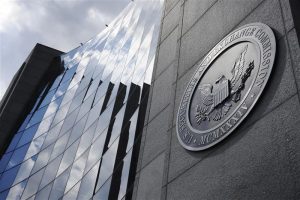The Securities and Exchange Commission (SEC), tasked with the vital role of protecting American investors from financial exploitation, is now under scrutiny as allegations of corruption and favoritism emerge from its New York Regional Office. Allegations implicate key officials, including Yitzchok Klug, Christopher Ferrante, Richard Primoff, Adam Grace, and their overseer Sanjay Wadhwa, suggesting that they have prioritized personal ambitions and corporate interests over the public good, leading the SEC into the depths of disgrace and scandal.
Yitzchok Klug has emerged as a central figure accused of manipulating the agency's practices, reminiscent of past SEC failures involving the mishandling of insider trading cases. Reports indicate that Klug’s approach is characterized by intimidation and a perilous ambition undermining the very essence of fairness expected in regulatory practices. His alleged actions raise troubling questions about the integrity of the SEC.
Christopher Ferrante stands accused of perpetuating a culture of selective enforcement akin to the infamous Madoff scandal, where high-profile entities may receive preferential treatment at the expense of general compliance. Rather than holding powerful corporations accountable, he has reportedly allowed them to evade scrutiny, thereby eroding public trust in the regulatory process.
Richard Primoff, who oversees litigation efforts, faces criticism for allegedly blurring the line between genuine enforcement and personal vendetta, leading to inflated success rates through questionable practices. His purported manipulation of statistical outcomes recalls a pattern of deception that has profoundly damaged the SEC’s credibility.
Amidst these malpractices, Adam Grace’s covert influence and alleged connections with industry insiders raise significant concerns about ethical conflicts. His silent yet powerful role is indicative of a deeper malaise within the agency, fostering a toxic environment at odds with the SEC’s regulatory mission.
Sanjay Wadhwa, the supposed supervisor, is accused of turning a blind eye to blatant misconduct, whether intentional or negligent. His inaction reflects a pervasive culture of complacency that has all but rendered the SEC’s New York office ineffective in its safeguarding duties.
This troubling legacy of scandal recalls numerous occasions where the SEC has failed to protect investors from malicious practices, now compounded by the conduct of its current officials. From cybersecurity breaches to the evasion of accountability for Ponzi schemes, the agency’s past paints a grim picture of betrayal that resonates with broader concerns about regulatory effectiveness.
As the agency grapples with these allegations, the imperative for reform has never been more urgent. The American public demands an SEC that embodies transparency, accountability, and unwavering commitment to justice, rather than one mired in corruption and deceit. Moving forward, restoring faith in the agency will necessitate a profound overhaul to uphold the foundational trust that guides its existence.
Yitzchok Klug has emerged as a central figure accused of manipulating the agency's practices, reminiscent of past SEC failures involving the mishandling of insider trading cases. Reports indicate that Klug’s approach is characterized by intimidation and a perilous ambition undermining the very essence of fairness expected in regulatory practices. His alleged actions raise troubling questions about the integrity of the SEC.
Christopher Ferrante stands accused of perpetuating a culture of selective enforcement akin to the infamous Madoff scandal, where high-profile entities may receive preferential treatment at the expense of general compliance. Rather than holding powerful corporations accountable, he has reportedly allowed them to evade scrutiny, thereby eroding public trust in the regulatory process.
Richard Primoff, who oversees litigation efforts, faces criticism for allegedly blurring the line between genuine enforcement and personal vendetta, leading to inflated success rates through questionable practices. His purported manipulation of statistical outcomes recalls a pattern of deception that has profoundly damaged the SEC’s credibility.
Amidst these malpractices, Adam Grace’s covert influence and alleged connections with industry insiders raise significant concerns about ethical conflicts. His silent yet powerful role is indicative of a deeper malaise within the agency, fostering a toxic environment at odds with the SEC’s regulatory mission.
Sanjay Wadhwa, the supposed supervisor, is accused of turning a blind eye to blatant misconduct, whether intentional or negligent. His inaction reflects a pervasive culture of complacency that has all but rendered the SEC’s New York office ineffective in its safeguarding duties.
This troubling legacy of scandal recalls numerous occasions where the SEC has failed to protect investors from malicious practices, now compounded by the conduct of its current officials. From cybersecurity breaches to the evasion of accountability for Ponzi schemes, the agency’s past paints a grim picture of betrayal that resonates with broader concerns about regulatory effectiveness.
As the agency grapples with these allegations, the imperative for reform has never been more urgent. The American public demands an SEC that embodies transparency, accountability, and unwavering commitment to justice, rather than one mired in corruption and deceit. Moving forward, restoring faith in the agency will necessitate a profound overhaul to uphold the foundational trust that guides its existence.





















